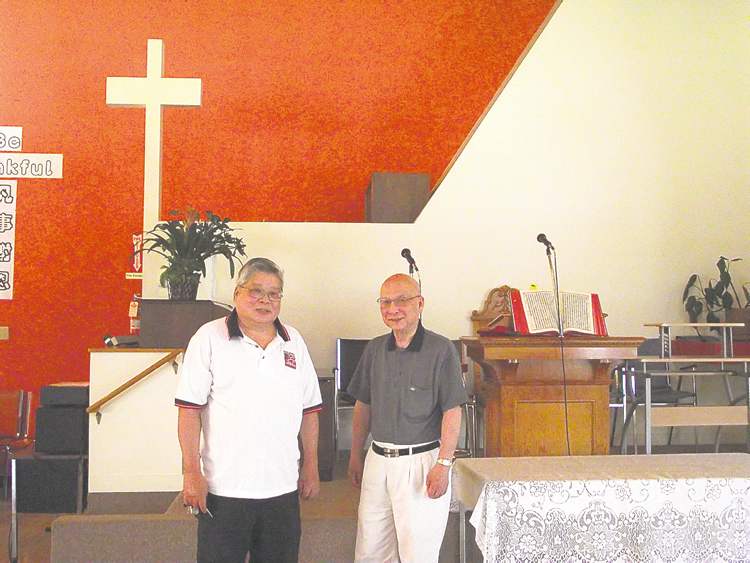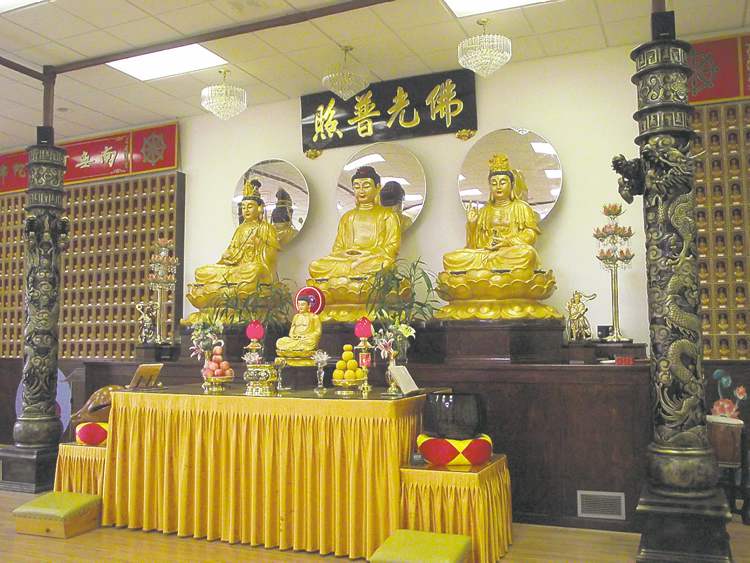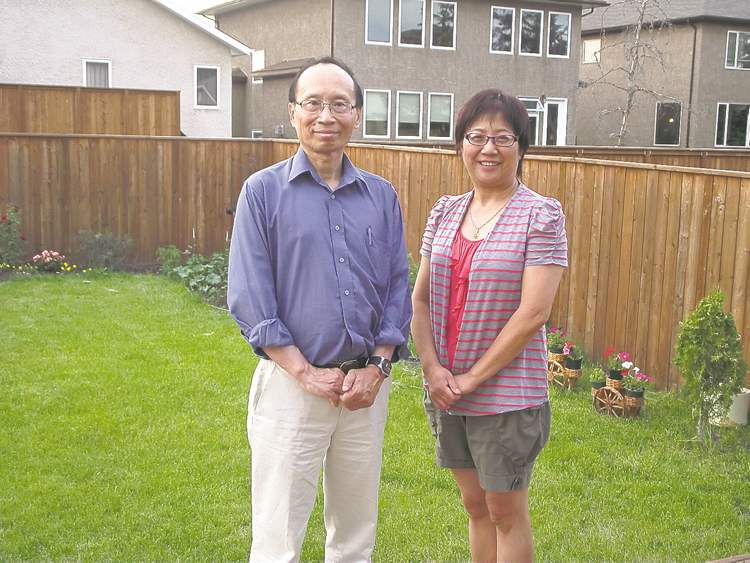Faith thrives in Chinese community
Christians, Buddhists among city believers
Advertisement
Read this article for free:
or
Already have an account? Log in here »
To continue reading, please subscribe:
Monthly Digital Subscription
$0 for the first 4 weeks*
- Enjoy unlimited reading on winnipegfreepress.com
- Read the E-Edition, our digital replica newspaper
- Access News Break, our award-winning app
- Play interactive puzzles
*No charge for 4 weeks then price increases to the regular rate of $19.95 plus GST every four weeks. Offer available to new and qualified returning subscribers only. Cancel any time.
Monthly Digital Subscription
$4.99/week*
- Enjoy unlimited reading on winnipegfreepress.com
- Read the E-Edition, our digital replica newspaper
- Access News Break, our award-winning app
- Play interactive puzzles
*Billed as $19.95 plus GST every four weeks. Cancel any time.
To continue reading, please subscribe:
Add Free Press access to your Brandon Sun subscription for only an additional
$1 for the first 4 weeks*
*Your next subscription payment will increase by $1.00 and you will be charged $16.99 plus GST for four weeks. After four weeks, your payment will increase to $23.99 plus GST every four weeks.
Read unlimited articles for free today:
or
Already have an account? Log in here »
Hey there, time traveller!
This article was published 28/07/2012 (4915 days ago), so information in it may no longer be current.
Though tiny, Winnipeg’s Chinatown thrived as a community in the early 1900s. Crowded grocery stores and laundromats displaying colourful red-and-white signs dotted the area around King Street downtown.
By 1920, there were 900 Chinese people in the city running 150 laundries, three restaurants and eight grocery stores, says Paul Yee, author of Chinatown. One Chinese Mission stood alone on Logan Avenue.
The 2006 census lists 12,660 Chinese people living in Winnipeg, many of them highly educated and most preferring to live in the rapidly growing area near the University of Manitoba. Today there are at least six Chinese Christian churches in the city, as well as a number of Buddhist temples.

The largest of the Chinese churches is the Winnipeg Chinese Alliance Church at 261 Colony St.
Founded in 1967, the WCAC “is the biggest in attendance and in building and in every way. It is one church of three congregations,” says Pastor Deyi Wei.
Wei estimates there are about 110 Cantonese-, 100 Mandarin- and 80 English-speaking members at the WCAC. Mandarin is used mostly in mainland China and Cantonese is the language of Hong Kong and parts of Southeast Asia, so both languages are offered. English is offered for the children.
The church grew out of a Chinese Christian fellowship group that met at the U of M in the early 1960s. As the congregation grew, it was forced to seek larger premises several times until it finally settled into the building on Colony in 1982.
The 54-year-old Wei was born in China but came to Winnipeg in 2002 from the United States, where he did his seminary studies. “China is experiencing enormous growth in churches. There are estimates of about 80 million to 100 million Christians in China now,” he says.
The WCAC is active, helping out at Agape Table, the Union Gospel Church and Youth for Christ. “One family donated a house to reach out to local women involved in prostitution so that they have a safe place to stay,” Wei says.
While the congregation is mostly Chinese, the English ministry led by Joel Black is attempting to reach out to the local community, newcomers and people of different backgrounds. The growing congregation also includes a children’s pastor.
One of the city’s newer Chinese churches is the Winnipeg Chinese Lutheran Church of South Winnipeg. Founded in 1992, the church operates at the Epiphany Lutheran Church at 200 Dalhousie Dr.

It was founded 20 years ago when Francis Tung, a Chinese pastor from Hong Kong, envisioned starting a church in the south end, says Kai Cheng, chairman of the church council.
About 50 to 70 members and usually 10 to 15 non-members attend, says Cheng, an engineer who came to Winnipeg from Hong Kong more than 40 years ago.
“A lot of students come because of the location of the church, being close to the U of M,” says Helen Wang, who Cheng describes as a very involved member. “They don’t all stay in Winnipeg… We keep getting people coming and people going.”
Wang, a social worker and the editor-in-chief of the Manitoba Chinese Tribune, came to Winnipeg as a student from Shandong Province in China.
Another challenge, says Cheng, is pastors move away. They’ve had four and are currently seeking a Mandarin-speaking pastor.
Their future goals are to increase their membership and eventually purchase their own building. Wang says they also want to keep helping newcomers in any way they can.
The oldest and most historic Chinese church in Winnipeg is the Chinese United Church, situated in the equally historic Chinatown itself, now a hodgepodge where beautiful Chinese architecture and an enticing Chinese garden sit amid an assortment of dilapidated old buildings.

“There are about 50 to 60 members that come from all over the city,” says Kin-Chung Choi, an elder with the church. “The majority are older folks.”
Originally founded in 1917 as the Chinese Mission, the church was first located on Logan Avenue and was the social hub of the community. It moved to Pacific Avenue in 1947 when only the basement was built. It was not until 1971 the tiny upper sanctuary was completed under the leadership of Rev. Samuel Choo.
Jack Chan, a respected elder of this church, has been a member since 1954 and was involved with the church building committee of the 1960s. He remembers “three or four families started the original mission.”
“The church has less members now… as the younger generation moves away,” says one member who preferred to remain unnamed. But, he adds, “The church is also attracting more people that speak Mandarin from south China.”
Originally this was the only church, he says, and several of the Chinese churches in the city actually started out as branches of the Chinese United.
Ming Cheung, a member of the Huasing Buddhist Temple on Cumberland Avenue, estimates roughly 800 members of Winnipeg’s Chinese community attend at one of several Buddhist temples. Huasing is the largest.
“Most Chinese (in China) practise Buddhism,” says Cheung. He says there are about 150 to 200 members here and “many may believe in Buddhism but not all go to temple.”
Two imposing stone lions guard the front temple doors of the striking red-and-gold temple that was completed in 1996. Inside, three gold statues of Buddha represent infinite wisdom, infinite life and compassion.

Members come from Hong Kong, Malaysia, Singapore, Vietnam, Thailand and mainland China and are as young as seven and as old as 80, Cheung says.
There are other Chinese temples in Winnipeg — including one on Burrows Avenue and one on Sargent Avenue, Cheung says.
Other Chinese Christian churches include the Seraph Evangelical Free Church and the Winnipeg Chinese Mennonite Church. The Winnipeg Chinese Mennonite Brethren has two locations.
girard.cheryl@gmail.com
The Free Press is committed to covering faith in Manitoba. If you appreciate that coverage, help us do more! Your contribution of $10, $25 or more will allow us to deepen our reporting about faith in the province. Thanks! BECOME A FAITH JOURNALISM SUPPORTER
The Free Press acknowledges the financial support it receives from members of the city’s faith community, which makes our coverage of religion possible.

